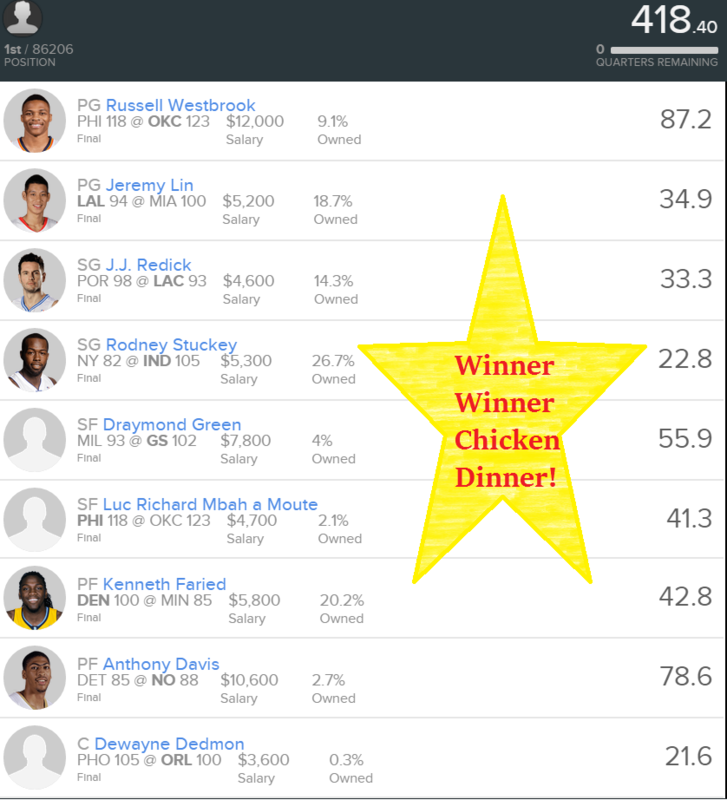
With Daily Fantasy Sports (DFS) understandably increasing in popularity on Steemit through the efforts of individuals like @daut44 & @steemrollin (check out this post to join the Steemit fantasy fooball league), it seems like a good time to begin looking at how us non-professionals can participate in the larger competitions while putting ourselves in contention for the big prize. Although we are now squarely in football season, I am primarily a low-stake NBA DFS tournament (GPP) player and therefore will be writing from that perspective. However, many of the concepts I will cover will be completely relevant to the other sports as well. I hope you enjoy!
That's been one of my mantras - focus and simplicity. Simple can be harder than complex: You have to work hard to get your thinking clean to make it simple. But it's worth it in the end because once you get there, you can move mountains. ~Steve Jobs
I'm pretty sure Steve Jobs wasn't referring to Daily Fantasy Sports when he gave the quote above, but I've personally found it incredibly helpful while working to develop my DFS game over the past 18 months. Like so many of my fellow Daily Fantasy Sports regulars, I stumbled on DFS through my background in poker and was instantly hooked. I deposited $200 on FanDuel to maximize their deposit bonus (I've since switched my play primarily to DraftKings) and away I went, bombing entries into low-stake Multi-Entry Guaranteed-Prizepool Tournaments (GPPs) with little rhyme or reason other than my inflated ego, slightly outdated knowledge of the NBA from my youth, and some basic strategy I picked up from friends and Google.
It doesn't take a Steve Jobs to figure out how that went...or even an Ashton Kutcher.
So there I was, an empty bankroll and a strange feeling in my belly that made me take pause; why did this all feel so familiar? Then it hit me like a ton of bricks: god damn it, I was a fish again! For those not familiar with the term, in poker a fish is a player perceived to be incredibly weak, the mark at the table. The thing is, in poker everyone starts as a fish; it is only once you gain some experience and begin evaluating your own strategy while exploring aspects of other people's game that you open up the possibility of transforming from a fish into a shark, from the prey into the predator.
It was then that I decided that if I was going to invest all this time-equity to learn how to play fantasy basketball and Daily Fantasy Sports in general, I would not allow myself to remain the prey for a second longer than was absolutely necessary! If I was going to dedicate myself to succeeding in this familiar world of online competition, I would do so by learning from my past mistakes, by pushing every edge I could find, and by maximizing the value of the opportunity I had, for as long as I had it. As NFL legend Lou Holtz once said:

We'll leave the third and more philosophical part of the equation for now and instead focus on the first two: Do the right thing & Do the best you can, which, of course, are both much easier said than done.
Once I had decided to commit myself to learn how to play DFS in this way, the most glaring shortcoming I thought I had was that, much to my parents disappointment, I did not grow up to be a computer programmer, mathematician or even a statistician. And to me at that time, this seemed like a DFS death sentence. How could I, a relative nobody with a limited bankroll, succeed in such a competitive field?
And while I can't say I have all the answers to that question, as the 2014-2015 NBA season commenced (I was forced to take most of last season off due to business commitments), I was slowly but surely making progress using the limited resources I had available to me, which would eventually culminate with my win in the FanDuel 150K Guaranteed Tournament against over 86,000 other teams with what I believe was, at the time, the highest recorded score in NBA DFS history and $10,000 grand prize!

Once I received the confidence boost from that win things felt like they really started clicking and, after resetting my bankroll to its original amount, I was able to more than double it - without a single score larger than 10% of my bankroll - through large-field GPP play in the final month of the season while putting myself in serious contention for another big score multiple times as the season wound down.
Now, in no way am I delusional enough to think I cracked the NBA DFS Matrix or am some basketball fantasy advice genius, quite the opposite; I know full well I ran way above expectation and most likely did not “deserve” the early success I had. However, I've had enough experience in variance-heavy games to know that there was nothing more critical to success than persistence, unyielding self-analysis and the ability to use that analysis to increase your expectation and give yourself the opportunity to contend each and every time you play, regardless of the resources available to you. Because, at the end of the day, putting yourself in contention is really the only thing you can ask for in a game like poker or DFS that is so heavily influenced by factors outside your control. Do the right thing, do the best you can, remember?
For that reason, future editions of this blog will cover the process by which I learned to maximize whatever edge I had without the help of a fancy predictive model or an Advanced Analytics degree from Harvard. I can't promise it will allow you to turn into a big winner overnight (or ever!), but I can promise that if you are currently playing DFS recreationally, or think you might like to try it in the future, this column will help guide you through the common pitfalls that many beginning DFS players face and hopefully help you put yourself in serious contention when your moment of rungood comes!
~ ~ ~
